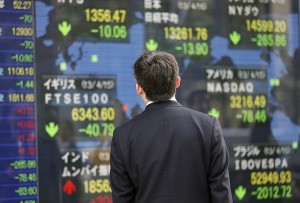
A man looks at an electronic stock indicator in Tokyo on Tuesday, April 16, 2013. Asian stock markets were mostly lower Tuesday as weak economic data, falling commodity prices and big losses on Wall Street shook investors. A deadly bombing in the US also rattled confidence. AP PHOTO/SHIZUO KAMBAYASHI
HONG KONG—Asian shares were mixed on Tuesday, with earlier losses pared after a huge sell-off on Wall Street, while traders were spooked by a double bombing that hit the Boston Marathon.
The weak China outlook hit commodity prices, with gold sinking to its lowest level since 2011 in New York after suffering its sharpest fall in 30 years, while on oil markets the Brent contract sat below $100 a barrel.
Tokyo fell 0.41 percent, or 54.22 points, to 13,221.44, and Sydney eased 0.34 percent, or 17.1 points, to 4,950.8. Seoul ended flat, edging up 1.76 points to 1,922.21 while Hong Kong was 0.46 percent lower, giving up 100.64 points to 21,672.03.
However, Shanghai rose 0.59 percent, or 12.91 points, to 2,194.85 on bargain-buying following three days of losses.
The morning saw huge losses across the region but most bourses clawed them back as earlier risk aversion dissipated.
Global markets suffered a downturn on Monday after China released data showing growth in the world’s No. 2 economy had slowed in the first quarter of the year, which was followed by weak US manufacturing figures.
Asian markets ended Monday in the red and Wall Street’s main indexes were already down when two explosions hit the Boston Marathon, one of the biggest sporting events in the US, killing at least three and injuring more than 100.
As cities across the United States went on high alert President Barack Obama said it was not yet clear who was behind the explosions.
While he did not say the blasts were a terror attack, a White House official said “any event with multiple explosive devices—as this appears to be—is clearly an act of terror.”
On Wall Street the Dow and S&P 500, which last week hit record highs, both slid. The Dow dived 1.79 percent and S&P 500 plunged 2.30 percent, while the tech-rich Nasdaq was 1.94 percent lower.
US data showing a larger-than-expected slowdown in New York state manufacturing in April and a drop in confidence of homebuilders added to concerns.
The dollar rebounded to 97.76 yen in early European trade, from 96.56 yen in New York Monday, but it is still well down from the 99.95 yen seen on Friday.
The euro was at 127.65 yen and $1.3055, against 125.98 yen and $1.3048.
The China results hit commodities, with gold at lows not seen since February 2011, while oil prices also sank, with Brent falling below $100 a barrel for the first time since mid-July.
Gold plunged more than 13 percent between Friday’s open and Monday’s close in New York on worries over China’s growth.
At one point in intraday US trade it fell as low as $1,338.00 an ounce—a fall of more than 10 percent representing its worst dive since February 28, 1983.
However, at 1045 GMT Tuesday the precious metal had recovered slightly and was at $1,391.10 an ounce.
Dealers have also been spooked by reports last week that Cyprus was preparing to liquidate some of its 14 tons of gold reserves to fund its part of an IMF-EU bailout plan.
But the broader view is that with inflation expectations still flat—as both US and Chinese data indicate—people who buy gold as a hedge against rising prices have been driven to dump bullion.
On oil markets Brent North Sea crude for May delivery shed $1.02 to $99.61 as the weak China figures raised concerns about demand from the world’s biggest energy consumer.
New York’s main contract, light sweet crude for May, dropped 71 cents to $88.00.
“You can’t continue buying risky high-yield assets, which require growth ultimately, if the growth outlook is deteriorating,” Greg Gibbs, senior foreign exchange strategist at the Royal Bank of Scotland in Singapore, told Dow Jones Newswires.
In other markets:
— Singapore rose 0.22 percent, or 7.21 points, to close at 3,291.58.
Real estate developer Capitaland was down 0.86 percent at Sg$3.47 while Singapore Telecom gained 1.40 percent to Sg$3.62.
— Taipei rose 0.48 percent, or 37.52 points, to 7,801.05.
Smartphone maker HTC rose 2.13 percent to Tw$263.5 while Taiwan Semiconductor Manufacturing Co. was 1.11 percent higher at Tw$100.5.
— Manila fell 0.75 percent, or 51.44 points, to 6,786.33.
SM Investment slipped 1.25 percent to 1,105 pesos while Ayala Corp. was down 0.91 percent at 595.50 pesos.
— Wellington fell 0.60 percent, or 26.87 points, to 4,427.83.
Fletcher Building was down 1.4 percent at NZ$8.45, casino operator SkyCity fell 2.1 percent to NZ$4.21 and Telecom was steady at NZ$2.44.
— Jakarta jumped 1.04 percent, or 50.66 points, to 4,945.25.
Cement producer Indocement Tunggal Prakarsa jumped 3.39 percent to 24,400 rupiah, while palm oil firm Astra Agro Lestari fell 1.62 percent to 18,250 rupiah.
— Kuala Lumpur added 0.16 percent, or 2.76 points, to 1,700.53.
Genting Malaysia gained 3.1 percent to 3.72 ringgit, while Petronas Dagangan added 2.3 percent to 23.50 ringgit. Hong Leong Financial Group shed 1.3 percent to 15.10 ringgit.
— Mumbai rose 2.11 percent, or 387.13 points, at 18,744.93 points, on hopes of an interest rate cut, as global commodity prices fell.
Maruti Suzuki rose 4.23 percent to 1,483.7 rupees. Oil and Natural Gas Corp. rose 3.87 percent to 331.5 rupees.
— Bangkok was closed for a public holiday.—Danny McCord